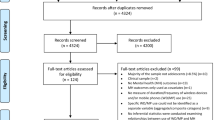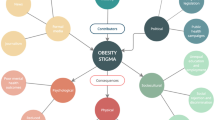Abstract
Obesity is a public health crisis that has reached epidemic proportions. Although intensive behavioral interventions can produce clinically significant weight loss, their cost to implement, coupled with resource limitations, pose significant barriers to scalability. To overcome these challenges, researchers have made attempts to shift intervention content to the Internet and other mobile devices. This article systematically reviews the recent literature examining technology-supported interventions for weight loss and maintenance among overweight and obese adults. Thirteen studies were identified that satisfied our inclusion criteria (12 weight loss trials, 1 weight maintenance trial). Our findings suggest that technology interventions may be efficacious at producing weight loss. However, several studies are limited by methodologic shortcomings. There are insufficient data to evaluate their efficacy for weight maintenance. Further research is needed that employs state-of-the-art methodology, with careful attention being paid to adherence and fidelity to intervention protocols.

Similar content being viewed by others
References
Papers of particular interest, published recently, have been highlighted as: • Of importance
Obesity and Overweight Factsheet. World Health Organization Web site. http://www.who.int/mediacentre/factsheets/fs311/en/index.html. Accessed November 15, 2011.
Flegal KM, Carroll MD, Ogden CL, Curtin LR. Prevalence and trends in obesity among US adults, 1999–2008. JAMA. 2010;303:235–41.
Mokdad AH, Ford ES, Bowman BA, Dietz WH, Vinicor F, Bales VS, et al. Prevalence of obesity, diabetes, and obesity related health risk factors, 2001. JAMA. 2003;289:76.
Poirier P, Giles TD, Bray GA, Hong Y, Stern JS, Pi-Sunyer FX, et al. Obesity and cardiovascular disease: pathophysiology, evaluation, and effect on weight loss. Atheroscler Thromb Vasc Biol. 2006;26:968–76.
Wadden TA, Berkowitz RI, Womble LG, et al. Randomized trial of lifestyle modification and pharmacotherapy for obesity. N Engl J Med. 2005;353:2111–20.
Alhassan S, Kim S, Bersamin A, King A, Gardner C. Dietary adherence and weight loss success among overweight women: results from the A to Z weight loss study. Int J Obes. 2008;32:985–91.
Baker RC, Kirschenbaum DS. Self-monitoring may be necessary for successful weight control. Behav Ther. 1993;24:377–94.
Diabetes Prevention Program Research Group. Achieving weight and activity goals among diabetes prevention program lifestyle participants. Obes Res. 2004;12(9):1426–34.
Wing R, Phelan S. Long-term weight loss maintenance. Am J Clin Nutr. 2005;82:2225–55.
Rao G, Burke LE, Spring BJ, et al. New and emerging weight management strategies for busy ambulatory settings: a scientific statement from the American Heart Association. Circulation. 2010;124(10):1182–203.
Bennett GG, Herring SJ, Puleo E, Stein EK, Emmons KM, Gillman MW. Web-based weight loss in primary care: a randomized controlled trial. Obesity. 2010;18:308–13.
McDoniel SO, Wolskee P, Shen J. Treating obesity with a novel hand-held device, computer software program, and Internet technology in primary care: The SMART motivational trial. Patient Educ Couns. 2010;79:185–91.
• Morgan PJ, Collins CE, Plotnikoff RC, et al. Efficacy of a workplace-based weight loss program for overweight male shift workers: the workplace POWER (Preventing Obesity Without Eating like a Rabbit) randomized controlled trial. Prev Med. 2011;52:317–25. This trial established the efficacy of an online weight loss program (Calorie King™), which contains self-monitoring tools for diet, physical activity, and weight, and an online social network. The Calorie King™ program is available to the public.
Morgan PJ, Lubans DR, Collins CE, Warren JM, Callister R. 12-month outcomes and process evaluation of the SHED-IT RCT: an internet-based weight loss program targeting men. Obesity. 2011;19:142–51.
Shuger SL, Barry VW, Sui X, et al. Electronic feedback in a diet- and physical activity-based lifestyle intervention for weight loss: a randomized controlled trial. Int J Behav Nutr Phys Act. 2010;8:41.
Touger-Decker R, Denmark R, Bruno M, O’Sullivan-Maillet J, Lasser N. Workplace weight loss program; comparing live and internet methods. J Occup Environ Med. 2010;52(11):1112–8.
van Wier MF, Dekkers JC, Hendriksen IJM, et al. Effectiveness of phone and e-mail lifestyle counseling for long term weight control among overweight employees. J Occup Environ Med. 2011;53(6):680–6.
• Burke LE, Conroy MB, Sereika SM, et al. The effect of electronic self-monitoring on weight loss and dietary intake: a randomized behavioral weight loss trial. Obesity. 2011;19:338–44. This well-designed and well-implemented clinical trial established the efficacy of a behavioral weight loss intervention using a handheld device.
Wing RR, Crane MM, Thomas JG, Kumar J, Weinberg B. Improving weight loss outcomes of community interventions by incorporating behavioral strategies. Am J Public Health. 2010;e1–7.
Maruyama C, Kimura M, Okumura H, Hayashi K, Arao T. Effect of a worksite-based intervention program on metabolic parameters in middle-aged male white-collar workers: a randomized controlled trial. Prev Med. 2010;51:11–7.
Thomas D, Vydelingum V, Lawrence J. E-mail contact as an effective strategy in the maintenance of weight loss in adults. J Hum Nutr Diet. 2010;24:32–8.
Bennett GG, Broome KM, Schwab-Pilley A, Gilmore P. A web-based approach to address cardiovascular risks in managers. J Occup Environ Med. 2011;53(8):911–8.
Harvey-Berino J, West D, Krukowski R, et al. Internet delivered behavioral obesity treatment. Prev Med. 2010;51:123–8.
Stone AA, Shiffman S, Schwartz JE, Broderick JE, Hufforz MR. Patient compliance with paper and electronic diaries. Control Clin Trials. 2003;24:182–99.
Livingstone MBE, Black AE. Markers of the validity of reported energy intake. J Nutr. 2003;133(3 suppl):895S–920S.
Prince SA, Adamo KB, Hamel ME, et al. A comparison of direct versus self-report measures for assessing physical activity in adults: a systematic review. Int J Behav Nutr Phys Act. 2008;5:56.
Carver C, Scheier M. On the self-regulation of behavior. New York: Cambridge University Press; 1998.
Christakis N, Fowler J. The spread of obesity in a large social network over 32 years. N Engl J Med. 2007;357:370–9.
Smartphone Adoption and Usage Report. PEW Research Center Web site. http://pewinternet.org/Reports/2011/Smartphones.aspx. Accessed November 15, 2011.
Disclosure
No conflicts of interest relevant to this article were reported.
Author information
Authors and Affiliations
Corresponding author
Rights and permissions
About this article
Cite this article
Coons, M.J., DeMott, A., Buscemi, J. et al. Technology Interventions to Curb Obesity: A Systematic Review of the Current Literature. Curr Cardiovasc Risk Rep 6, 120–134 (2012). https://doi.org/10.1007/s12170-012-0222-8
Published:
Issue Date:
DOI: https://doi.org/10.1007/s12170-012-0222-8




